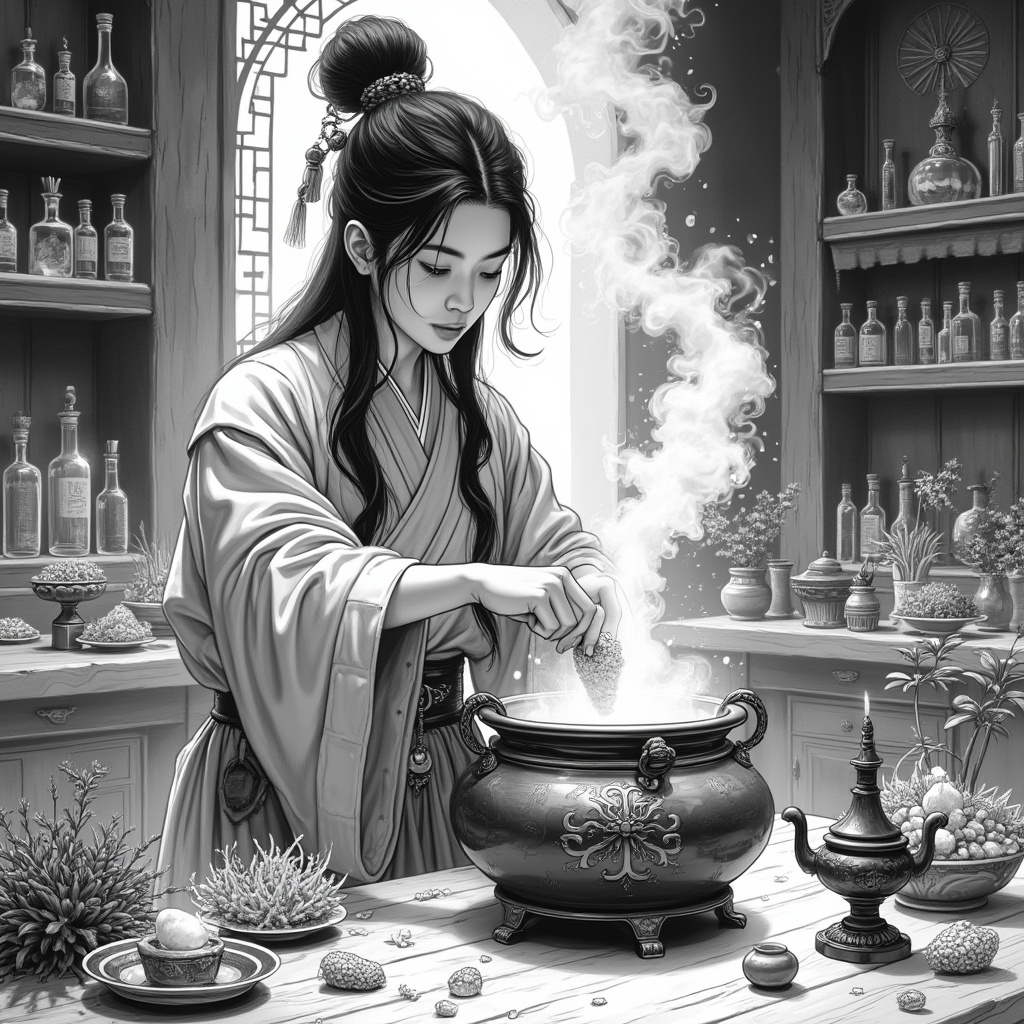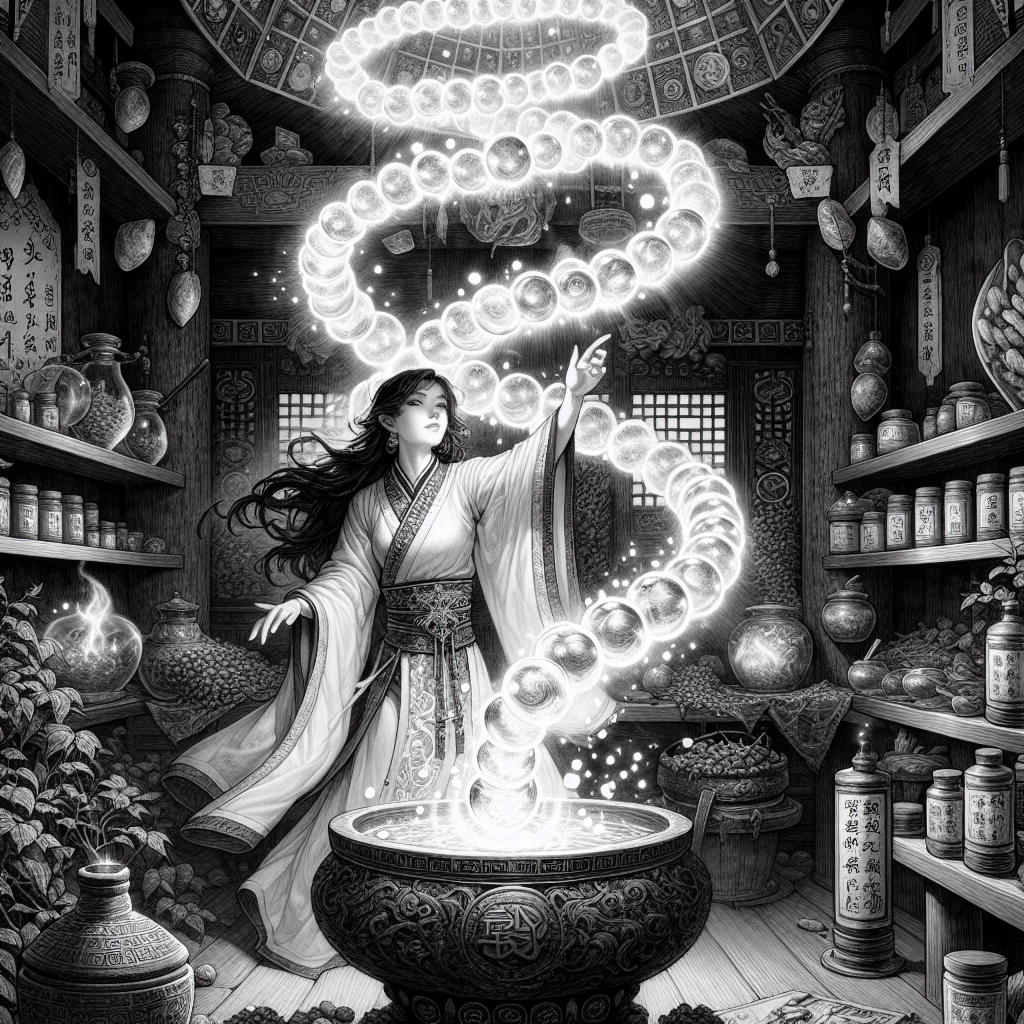Game Design Philosophy - Crafting Systems
Redesigning XP and Crafting Systems in Celestial Ascendance
One of the most distinctive rulesets from BECMI D&D is the treasure-and-gold-based XP system, which rewards adventurers for acquiring wealth. For Celestial Ascendance, we decided to step away from such material-based advancement to create a cultivation-focused experience driven by the mystical practices of ascension.
However, while revising the XP structure is critical in developing such a thematic game, another classic D&D mechanic also demanded attention: the crafting rules, particularly for potions. Let’s explore how crafting rules for BECMI D&D compare to Celestial Ascendance's cultivation-based Liàn Dān system—and, more importantly, how potion crafting works in the latter.
Potion Creation in BECMI D&D

In BECMI D&D, crafting a potion is a high-level activity reserved for those at level 9 or above, signaling a character’s expertise and mastery over magical practices. The game uses a percentage-based formula to determine success:
Success Chance (Potion Crafting) = (INT + Class Level) × 2 − (3 × Spell Level)
The higher the character’s intelligence and level, the more likely they are to succeed. However, higher-level potions become significantly harder to craft, reflecting the increased complexity of imbuing the magic.
Example: Potion of Fire Resistance (Equivalent to a 3rd-Level Spell)
If a Magic-User has 16 Intelligence and is 9th level, the success chance would be:
- Success Chance = (16 + 9) × 2 − (3 × 3)
- Success Chance = 25 × 2 − 9
- Success Chance = 50 − 9 = 41%
This calculation shows that crafting more challenging potions (like the 3rd-level Potion of Fire Resistance) poses a significant risk for even skilled characters. But the biggest barrier is the character class name level requirement.
Introducing the Liàn Dān System in Celestial Ascendance

The Liàn Dān system in Celestial Ascendance rethinks potion crafting by framing it as a mystical alchemical practice tied to cultivation principles. Unlike the percentage-based mechanics of BECMI, Liàn Dān uses a 3d6 roll modified by the character’s INT modifier, compared to a target roll based on character level and potion difficulty.
Liàn Dān Success Roll = 3d6 + INT Modifier ≥ Target Number
- The base target number starts at 15 + the Potion Level.
- For every 3 levels a character advances, the base target number decreases by 1 (e.g., at level 4, the base becomes 14; at level 7, the base becomes 13, and so on).
The Roll is compared to the following table:
| Roll Result | Description |
| Nat 3 | Catastrophic Failure: A severe mishap occurs, wasting all ingredients and causing 3d6 damage or danger to the surroundings (e.g., a small explosion, summoning hostile spirits, poisoning) within 10’ radius. The practitioner needs to take a long rest before they can start making pills again. |
| TN -6 | Major Failure: The entire batch is ruined, wasting all ingredients. The alchemist may experience minor negative side-effects (e.g., nausea, headaches). The practitioner needs to take a long rest before they can start making pills again. |
| TN -4 | Minor Failure: The batch fails, wasting half the ingredients. A minor anomaly occurs (harmless but flavorful, e.g., odd smells, faint glowing). |
| TN -2 | Minor Success: Produce 1 pill with lesser effect. Any die roll would be one size smaller (i.e. d6+1 becomes d4). |
| TN | Basic Success: Produces 1d4 pill with standard effects. |
| TN +2 | Skilled Success: Produces 1d6 pill with standard effects. |
| TN +4 | Expert Success: Produces 1d8 pill with standard effects. |
| TN +6 | Master Success: Produces 1d10 pill with standard effects. |
| Nat 18 | Transcendent Success: 1 of the pills has a legendary effect (DM determined) |
| TN +8 | Grand Master Success: Produces 1d12 pill with standard effects. |
This system gives a smoother progression to crafting success as the character grows more powerful, emphasizing the narrative progression of mastery in alchemy through cultivation.
Example: Potion of Fire Resistance in Liàn Dān
Assume a level 4 alchemist with an Intelligence score of 16 (INT modifier +2) attempting to craft the equivalent of the Potion of Fire Resistance (a 3rd-level potion). The target number at level 4 is:
- Target = 15 + Spell Level − Level Reduction = 15 + 3 − 1 (level 4 = −1)
- Target = 17
Now, the player rolls 3d6 and adds their INT modifier (+2). If their result is 17 or higher, the potion is successfully crafted.
Example roll: A roll of 11 (on 3d6) + 2 (INT modifier) = 13. Since 17 minus 13 = 4, which is equaled to TN -4, the attempt is a minor failure. The batch failed and wasted half the ingredients with a minor anomaly occurred (harmless but flavorful, e.g., odd smells, faint glowing).
This system encourages care and preparation when attempting higher-level potions early in the cultivation journey.
Comparing the Two Systems
Accessibility
In BECMI, potion crafting is restricted to high-level characters, reflecting the late-game magical expertise required. By contrast, Celestial Ascendance opens the door to potion crafting at any level, provided the character has the necessary resources and training. This makes the system more flexible for earlier play while maintaining increasing difficulty for high-level creations.
Mechanics
BECMI’s percentage formula lends itself to quick calculations but can feel static in play. The Liàn Dān system offers a dynamic experience, where rolling dice creates tension and excitement—aligning with the mystical and uncertain nature of cultivation practices.
Progression
Liàn Dān rewards progression not just mechanically but thematically: mystical mastery and character growth gradually tilt the odds in favor of the alchemist. This gradual improvement mirrors the journey of ascension central to Celestial Ascendance.
Conclusion
Potion crafting in Celestial Ascendance seeks to capture the narrative essence of cultivation while remaining grounded in enjoyable mechanics. The Liàn Dān system transforms potion making into an integral part of the ascension journey—an experience of risk, refinement, and, ultimately, mastery. By comparing it with the more rigid but iconic BECMI approach, we see how cultivation-inspired design can breathe new life into traditional fantasy RPG systems.
In Celestial Ascendance - Adventures in Xiūxiān Alpha 1.3.0, I incorporated this new game mechanic under the section called "Art of Cultivation: Verdant Essence Mastery (青翠精華掌握)" to learn about the new Liàn Dān system. Then, compare it with the following section, "Art of Cultivation: Celestial Herb Alchemy (天草炼丹)," which still uses the older game mechanics. I’m curious to know which one provides an easier gameplay experience.
Get Celestial Ascendance: Adventures in Xiūxiān
Celestial Ascendance: Adventures in Xiūxiān
Harness Qi and Ascend: Experience the freedom of OSR in the heart of Xiūxiān!
| Status | In development |
| Category | Physical game |
| Author | JadePhoenixGames |
| Tags | becmi, chinese, cultivation, mystara, OSR, Solo RPG, Tabletop role-playing game |
More posts
- 202507 status UpdateJun 30, 2025
- Brief Update - 202504Apr 20, 2025
- Game Design Update - Version 1.4.0Feb 09, 2025
- Experience Through Cultivation: A New Approach to Growth in Celestial Ascendance...Dec 01, 2024
- November 2025, Minor updateNov 03, 2024
- Introducing Celestial Ascendance - A Journey into XiūxiānOct 27, 2024

Leave a comment
Log in with itch.io to leave a comment.